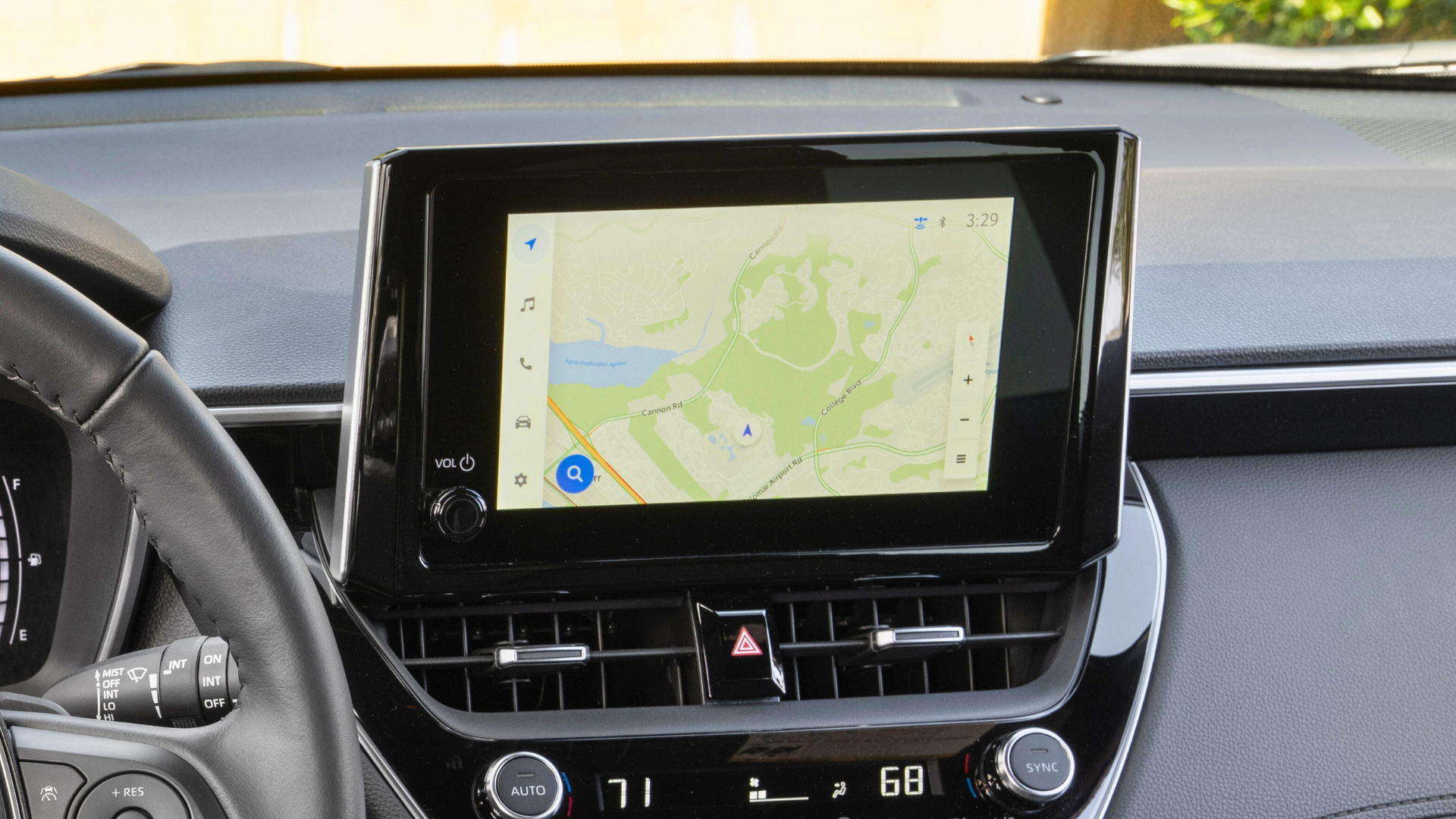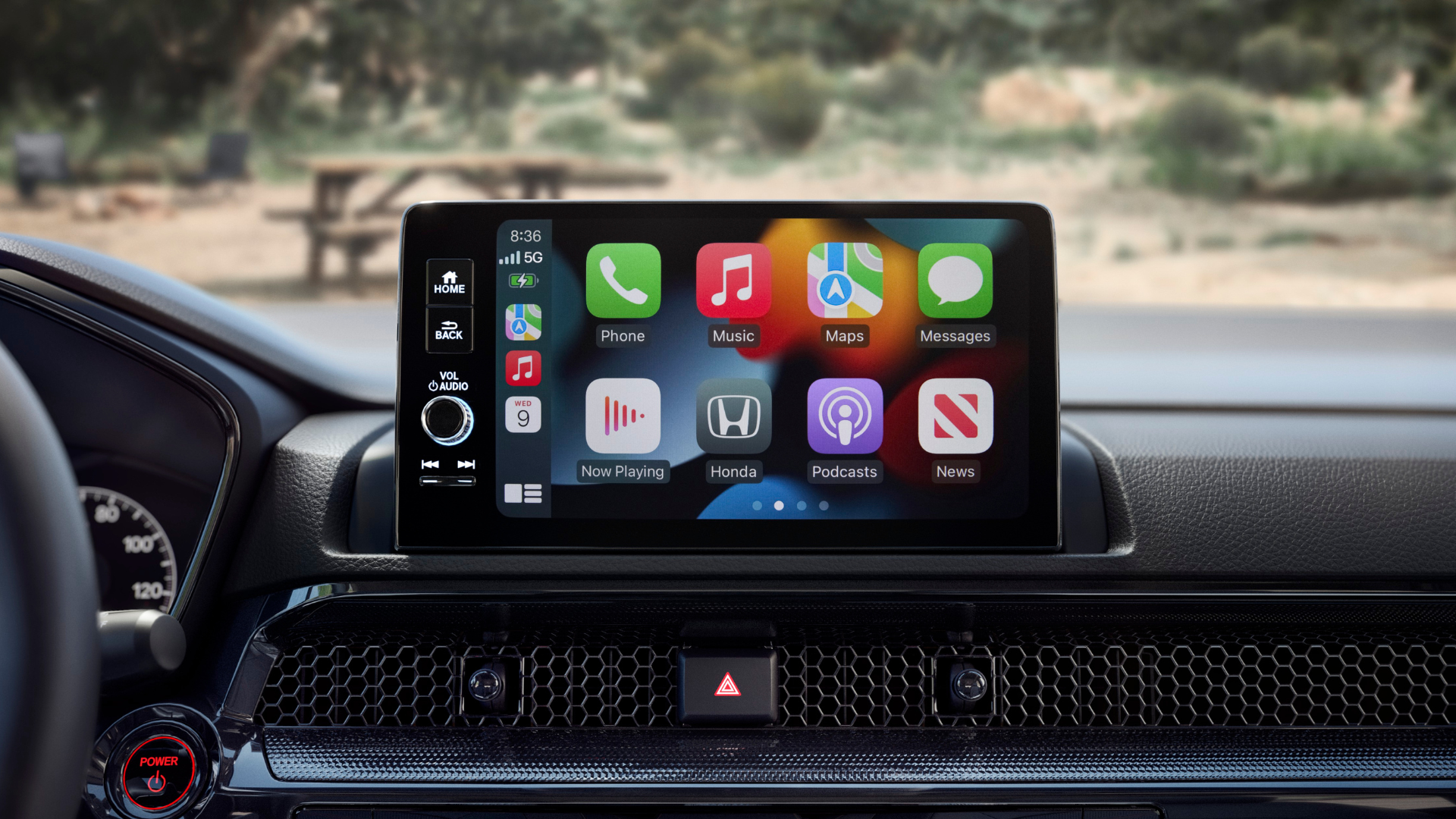-
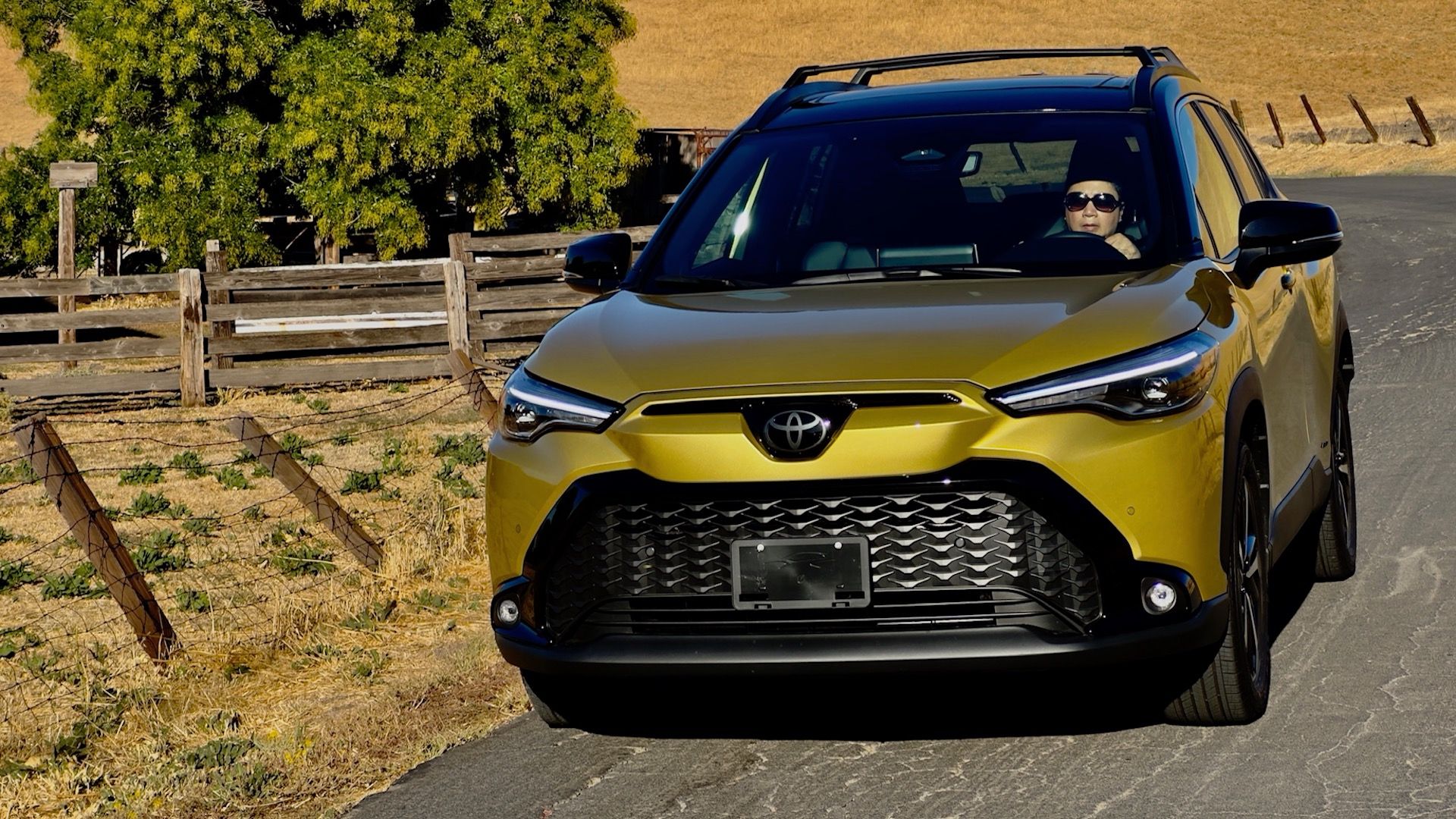
2024 Toyota Corolla Cross Hybrid
Driving enthusiasts lusting after low 0-60 times and high skidpad numbers will probably turn their noses up at the idea of living with a 2024 Toyota Corolla Cross Hybrid as their only means of transportation. However, they are a minority. Most people are simply trying to get from Applebee’s to Zales, which the 2024 Toyota Corolla Cross Hybrid accomplishes while returning 42 miles for every gallon of regular it consumes.
Pros- Fuel efficiency
- AWD standard
- Affordable base price
- Reputation for reliability
- Two years complimentary maintenance
Cons- Mediocre performance
- Uninspiring interior design
- Average handling and braking
- Noisy engine
- Not as exciting as rivals
-
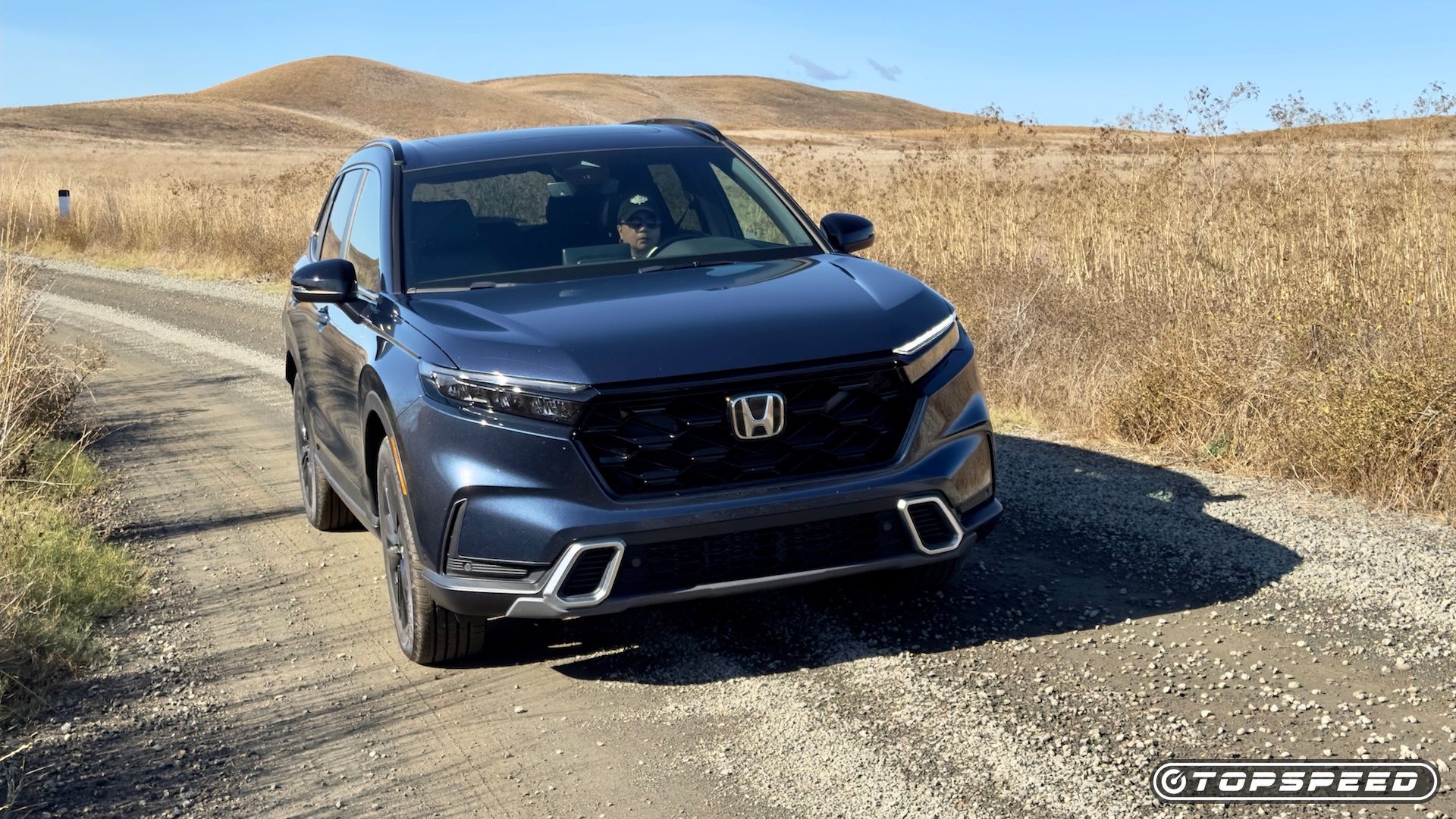
2024 Honda CR-V Hybrid Sport Touring AWD
Blending SUV styling with passenger car components and great fuel economy, the original Honda CR-V was one of the first compact crossover SUVs to market. In fact, it was introduced before the category even had a name. Today’s Honda CR-V remains one of the best offerings in its category.
Pros- Good handling
- Generous cargo capacity
- Refined and sophisticated
- Good fuel economy
- Strong roster of active safety features
Cons- Feels slightly underpowered
- Can get pricey
- Continuously variable transmission
- Tech interface is a bit dated
- Not as cutting edge as it once was
Here we have a compelling duel between two top-line Japanese hybrid models striving to reach new heights in the compact, partly electrified crossover market. Toyota’s second foray into the hybrid crossover market with the Corolla Cross Hybrid has not been without its share of criticism, with some discerning reviewers condemning its supposed inability to induce excitement. Yet, upon closer inspection, parallels emerge with the critiques once aimed at its sedan counterpart, the ever-popular Corolla. With a staggering 50 million satisfied buyers and a historical legacy, the question arises: can such a multitude of consumers be so misguided in their preferences?
In the opposite corner stands the Honda CR-V, a pioneering force in the compact crossover segment since its debut in 1997. Trailblazing the amalgamation of SUV aesthetics with the practicality of passenger car components, the CR-V has consistently distinguished itself in a market it played a pivotal role in shaping.
Rooted in Honda’s foresight that consumers sought the SUV image without the need for specifically off-road capabilities, the CR-V quickly became a sensation and maintains its position as a paragon of success in its category. As we explore the nuances of these two modern hybrid contenders, the stage is set for a confrontation that transcends mere automotive rivalry, delving into the core attributes that define a truly exceptional crossover.
In order to bring you the most up-to-date and accurate comparison possible, we’ve relied on information sourced from Toyota, Honda, Fueleconomy.gov, NHTSA, IIHS, and hands-on experience. For information regarding our ranking and grading procedures, please refer to our
methodology policy
.
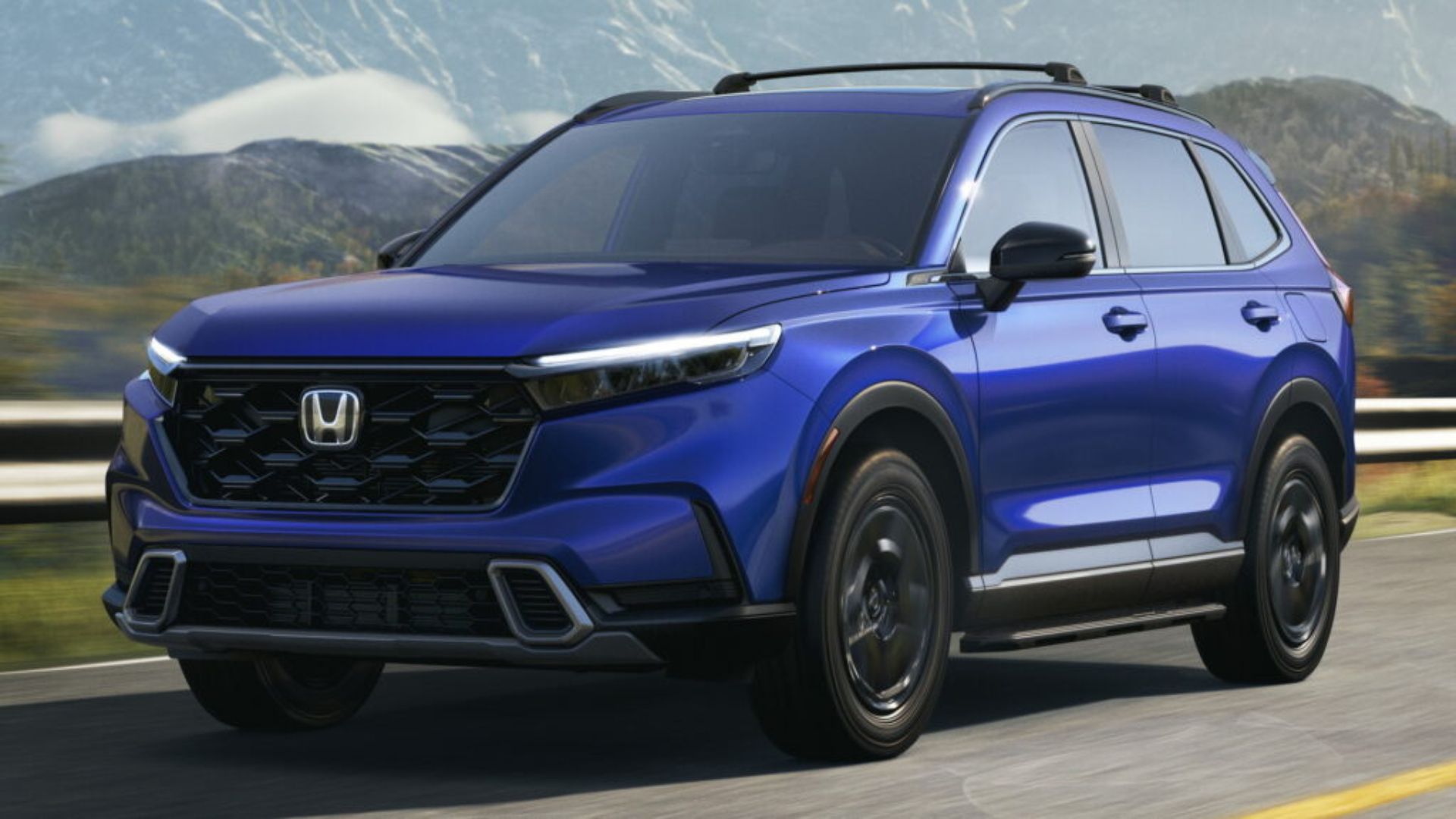
2024 Honda CR-V Hybrid: A Comprehensive Guide On Features, Specs, And Pricing
The Honda CR-V Hybrid is one of the most popular hybrid SUVs currently on sale, and here’s everything you need to know about the 2024 model.
Performance And Capability
The 2024 Toyota Corolla Cross Hybrid XSE 4WD has a dynamic hybrid powertrain, pairing a 2.0-liter four-cylinder engine with two electric motors via a pre-programmed continuously variable transmission (CVT). With 196 horsepower and 139 pound-feet of torque at its disposal, this all-wheel-drive model achieves a commendable 42 MPG in combined driving. Fueled by a lithium-ion battery pack, it balances performance with a towing capacity of 1,500 pounds and a payload capability of 1,170 pounds, emphasizing versatility.
On the other side, the Honda CR-V offers diverse powertrain options, featuring a base 190-horsepower turbocharged 1.5-liter inline four-cylinder engine with a CVT and the option for front or all-wheel drive. The CR-V Hybrid, with a 2.0-liter inline-four and electric motors, achieves a robust total system output of 204 horsepower, delivering a notable 37 MPG fuel efficiency and a 1,000-pound towing capacity. Both models exemplify the evolving landscape of hybrid SUVs, each bringing its own blend of power, efficiency, and versatility to the forefront.
Base Powertrain Comparison
-
2024 Toyota Corolla Cross Hybrid 2024 Honda CR-V Hybrid Sport Touring AWD Engine 2.0L DOHC Hybrid I-4 2.0L DOHC Hybrid I-4 Transmission CVT CVT Horsepower 196 @ 6,600 rpm 204 @ 6,100 RPM Combined Torque 151 LB-FT @ 5,400 rpm 247 LB-FT @ 0-2,000 RPM Combined Driveline Front Engine/Triple Motor, AWD Front Engine, AWD MSRP $27,970 $40,200 Towing Capacity 1,500 Pounds 1,000 Pounds
The Corolla Cross Hybrid XSE 4WD prioritizes efficiency without compromising on its technological sophistication. Its Electronically Controlled Continuously Variable Transmission (ECVT) ensures super-smooth gear transitions, complemented by a Permanent Magnet Synchronous motor for enhanced overall efficiency. The 10 pre-programmed “speeds” contribute to a balanced and controlled ride, emphasizing a thoughtful approach to driving dynamics.
Shifting focus to the Honda CR-V, the performance narrative extends beyond the hybrid variant. The base model, with its 190-horsepower turbocharged 1.5-liter inline four-cylinder engine and a continuously variable transmission (CVT), provides a spirited driving experience. However, for those favoring a more traditional powertrain, the CR-V Hybrid trims offer a dynamic blend of a 2.0-liter inline-four, electric motors, and a lockup clutch automatic transmission, generating a robust 204 horsepower.
Full Performance Specifications
|
Toyota Corolla Cross Hybrid XSE |
Honda CR-V Hybrid Sport Touring |
|
|
Engine |
2.0-liter DOHC I-4/Triple Electric Motor |
2.0-liter DOHC Inline Four-Cylinder |
|
Transmission |
Electronically Controlled Continuously Variable Transmission (ECVT) |
Continuously Variable (CVT) |
|
Horsepower |
196 HP @ 6,000 RPM (combined) |
204 HP @ 6,100 RPM |
|
Torque |
139 LB-FT @ 4,400 RPM |
247 LB-FT @ 0-2,000 RPM |
|
Motor |
Permanent Magnet Synchronous |
AC Synchronous Permanent-Magnet |
|
Fuel Economy (CMB) |
42 MPG |
37 MPG |
|
0-60 MPH |
8 Seconds |
7.9 Seconds |
|
Top Speed |
N/A |
111 MPH |
(Data sourced from Toyota and Honda)
As these two engines square up in the ring, the Toyota Corolla Cross Hybrid XSE 4WD and Honda CR-V Hybrid both exhibit distinct strengths. The Corolla Cross prioritizes efficiency. With 10 pre-programmed “speeds,” it delivers a balanced and controlled ride.
On the flip side, the CR-V, while offering a spirited drive, presents a dynamic alternative for motorists with its 2.0-liter inline-four, electric motors, and lockup clutch automatic transmission, producing a robust 204 horsepower. While the Corolla Cross emphasizes efficiency and tech sophistication, the CR-V Hybrid excels in versatile performance options to suit varied driving preferences.
Fuel Economy
When it comes to fuel efficiency, the Toyota Corolla Cross Hybrid XSE outshines the Honda CR-V Hybrid Sport Touring in various categories. Cruising through city streets, the Corolla Cross attains an impressive 45 MPG compared to the CR-V’s 40 MPG. This efficiency advantage then extends to highway driving, where the Corolla Cross achieves 38 MPG, surpassing the CR-V’s 34 MPG. The combined fuel economy figures further emphasize the Corolla Cross’s edge, boasting a commendable 42 MPG, while the CR-V settles at 37 MPG.
|
Model |
Toyota Corolla Cross Hybrid XSE |
Honda CR-V Hybrid Sport Touring |
|---|---|---|
|
Engine |
2.0-liter DOHC I-4/Triple Electric Motor |
2.0-liter DOHC Inline Four-Cylinder |
|
City |
45 MPG |
40 MPG |
|
Highway |
38 MPG |
34 MPG |
|
Combined |
42 MPG |
37 MPG |
(Figures Sourced From The EPA)
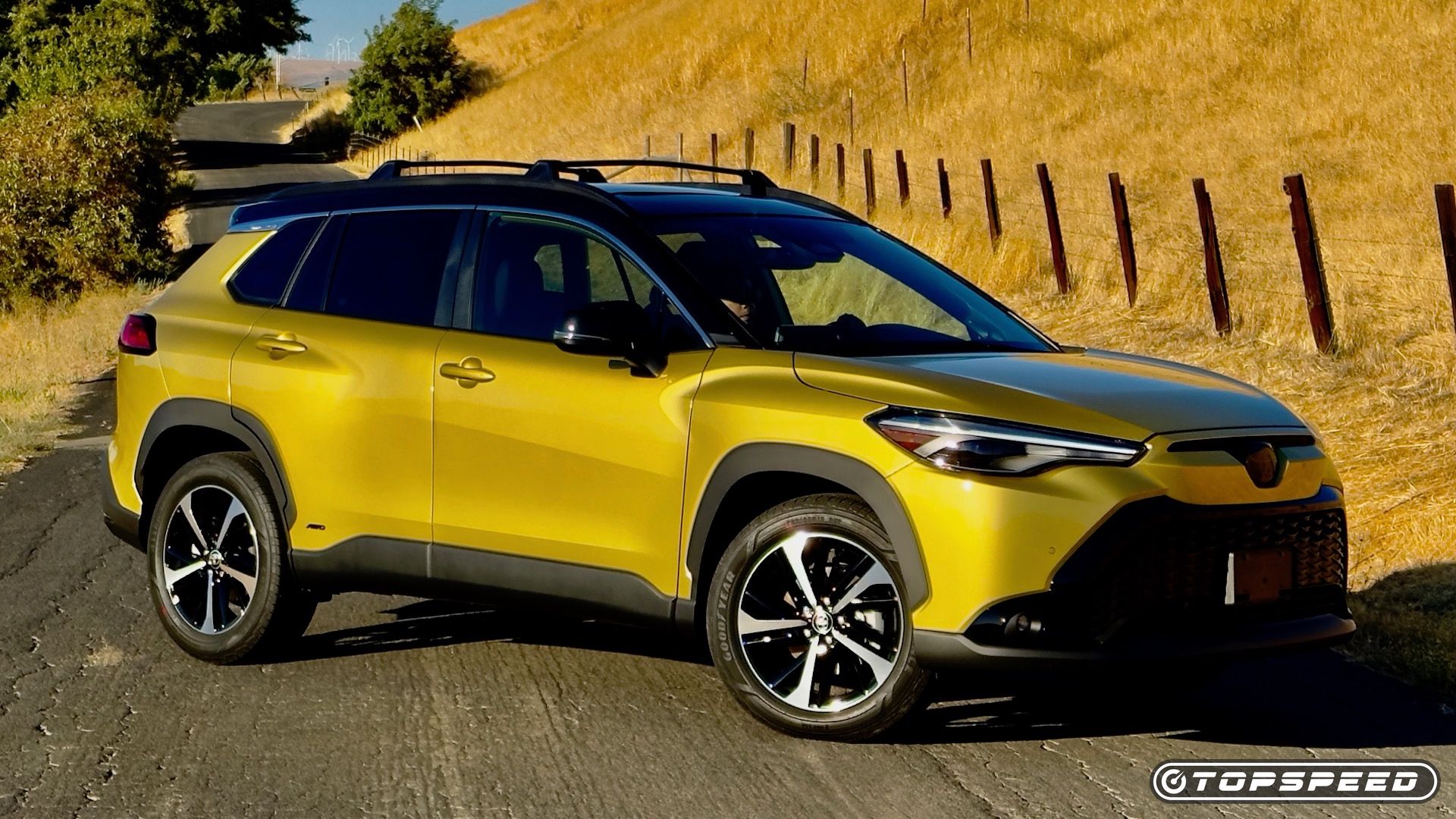
Toyota Corolla Cross Hybrid Pricing, Trims, Features, And Capability Explained
The Toyota Corolla Cross Hybrid, with four trims and an AWD drivetrain, offers impressive fuel economy and spaciousness, at an affordable price point.
Interior Design And Technology
The interior design of the Toyota Corolla Cross Hybrid embraces simplicity without compromising functionality. Devoid of excessive frills, the cabin boasts an uncluttered layout with straightforward controls, presenting an honest and user-friendly driving environment. The XSE trim, offering wireless smartphone compatibility and heated front seats, adds a touch of luxury.
Simulated leather upholstery, blind-spot monitoring, a sunroof, and ambient interior lighting contribute to the refined atmosphere. Notably, the Corolla Cross Hybrid’s cargo capacity, at 21.5 cubic feet, surpasses its sedan sibling, enhancing practicality for daily use.
In contrast, the 2024 Honda CR-V Hybrid Sport Touring AWD boasts a clean and sophisticated interior marked by clever details. The honeycomb trim across the dash cleverly conceals HVAC outlets, contributing to the overall neat appearance. The focus on simplicity extends to tasteful material choices, with contrasting stitching enhancing the leather upholstery. Soft-touch materials, strategically placed for comfort, create an upscale feel.
Noteworthy features include all-day comfort in the front seats, an upright driving position, and reclining rear seatbacks, ensuring a pleasant experience during extended drives. In essence, both models showcase distinct interior philosophies — the Corolla Cross Hybrid prioritizes simplicity and user-friendliness, while the CR-V Hybrid emphasizes sophistication and thoughtful details.
Toyota vs. Honda Technology Comparison
Inside the Corolla Cross, the infotainment and tech offerings strike a balance between convenience and innovation. Standard features include CarPlay and Android compatibility, along with satellite radio, ensuring seamless connectivity for a variety of devices. The user-friendly interface minimizes distractions, and the absence of overwhelming buttons and switches enhances the simplistic design ethos.
Optional upgrades, available on the top-of-the-line XSE trim featured here, encompass wireless smartphone charging, rear-seat USB ports, and a premium JBL audio system, elevating the in-car entertainment experience.
In the Honda, the infotainment and tech integration, particularly in the Sport Touring version we’re looking at, exemplify a commitment to user-friendly functionality and modern connectivity. Accessed through a nine-inch touchscreen, the infotainment interface features wireless CarPlay and Android compatibility, providing seamless smartphone integration. Noteworthy is the inclusion of a tuning knob for radio volume adjustments, enhancing the ease of use.
The Sport Touring trim includes a 12-speaker Bose audio system, ensuring a premium auditory experience. Navigation, while somewhat redundant in the smartphone era, is integrated, and wireless charging, along with USB-A and USB-C ports, caters to front-seat occupants. Rear passengers benefit from a pair of USB-C ports.
The climate control system, featuring generously sized dials and buttons, provides dual-zone functionality. Conveniently located switches on the center console offer easy access to the CR-V’s drive modes, including Economy, Normal, and Sport, along with hill descent control, an e-brake, and brake hold functions.
Interior Room And Cargo Capacity
When it comes to cargo space, the Toyota Corolla Cross Hybrid XSE and Honda CR-V Hybrid Sport Touring present distinct advantages depending on the user’s needs. The Corolla Cross takes an initial lead with a standard capacity of 40.3 cubic feet, surpassing the CR-V’s 34.7 cubic feet. However, when the rear seats are folded down, the tables turn, and the Honda CR-V claims the crown with an impressive 76.5 cubic feet, outclassing the Corolla Cross’s 61.8 cubic feet.
While the Honda excels in maximum cargo volume, the Toyota maintains a practical edge for daily use with its generous cargo capacity as standard. The choice between these models hinges on individual preferences, with the Corolla Cross offering a balanced standard capacity and the CR-V providing unmatched spaciousness when the rear seats are folded.
Cargo Space Comparison
|
Vehicle |
Toyota Corolla Cross Hybrid XSE |
Honda CR-V Hybrid Sport Touring |
|---|---|---|
|
Standard Capacity |
40.3 Cubic-Feet |
34.7 Cubic-Feet |
|
Seats Laid Down (if applicable) |
61.8 Cubic-Feet |
76.5 Cubic-Feet |
(Specs sourced from Toyota and Honda)

4WD Vs. AWD: The Differences Explained
Despite sharing some similarities, here’s a comprehensive breakdown of the differences between 4WD and AWD drivelines and what sets them apart
Safety And Reliability
Both the 2024 Toyota Corolla Cross Hybrid and the 2024 Honda CR-V Hybrid prioritize safety with a comprehensive suite of features. The Corolla Cross is equipped with Toyota Safety Sense 3.0, offering advanced collision protection through the TNGA-C platform.
The Pre-Collision System with Pedestrian Detection extends its capability to recognize motorcyclists, and Lane Departure Alert with Steering Assist and Lane Tracing Assist enhances lane recognition. Dynamic Radar Cruise Control, Blind Spot Monitor, Rear Cross Traffic Alert, Hill Start Assist Control, Automatic High Beams, and Road Sign Assist further contribute to a robust safety package.
Similarly, the Honda CR-V Hybrid features a meticulous safety approach with standard offerings such as the Advanced Compatibility Engineering body structure, multiple airbags including knee airbags, anti-lock braking system, Vehicle Stability Assist with traction control, and a three-point seat belt system for all positions.
The CR-V ensures occupant safety with features like LED Daytime Running Lights, a multi-angle rearview camera, and a Tire Pressure Monitoring System. Honda’s commitment to safety is evident in its comprehensive safety features, providing occupants with a high level of protection irrespective of the model’s size or price. Ultimately, both models prioritize occupant safety through innovative safety technologies and proven engineering.
2023 Toyota Corolla Cross Hybrid Crash Test
NHTSA 5-Star Safety Ratings
|
Overall Rating |
N/A |
|
Overall Front Crash Rating |
4 out of 5 |
|
Overall Side Crash Rating |
5 out of 5 |
|
Rollover Rating |
N/A |
- Recalls (NHTSA): 0
- NHTSA Investigations: 0
- NHTSA Consumer Complaints: 0
- Awards: N/A
2024 Honda CR-V Crash Test
NHTSA 5-Star Safety Ratings
|
Overall Rating |
5 out of 5 |
|
Overall Front Crash Rating |
4 out of 5 |
|
Overall Side Crash Rating |
5 out of 5 |
|
Rollover Rating |
4 out of 5 |
- Recalls (NHTSA): 0
- NHTSA Investigations: 0
- NHTSA Consumer Complaints: 1 complaint related to the reversing camera randomly switching between black and white and color
- Awards: N/A
Reliability Comparison
The Toyota Corolla Cross Hybrid XSE and the Honda CR-V Hybrid Sport Touring inherit a legacy of reliability from their respective manufacturers. Toyota has long been celebrated for producing durable and dependable vehicles, with the Corolla model, in particular, boasting a reputation for longevity and minimal maintenance issues. Honda, too, is renowned for its reliability, and the CR-V model aligns with this tradition.
Both manufacturers consistently rank high in reliability assessments and have cultivated a reputation for building vehicles that stand the test of time. Considering the robust track records of Toyota and Honda in the automotive industry, prospective buyers can reasonably expect both the Corolla Cross Hybrid and CR-V Hybrid to offer a reliable and enduring driving experience.
Warranty
|
Vehicle |
Toyota Corolla Cross Hybrid XSE |
Honda CR-V Hybrid Sport Touring |
|---|---|---|
|
Basic Warranty |
3 Years / 36,000 Miles |
3 Years / 36,000 Miles |
|
Drivetrain Warranty |
5 Years / 60,000 Miles |
5 Years / 60,000 Miles |
|
Hybrid System Warranty |
8 Years / 100,000 Miles |
8 Years / 100,000 Miles |
|
Hybrid Battery Warranty |
10 Years / 150,000 Miles |
N/A |
|
Corrosion Warranty |
12 Years / Unlimited Miles |
5 Years / Unlimited Miles |
|
Roadside Assistance |
2 Years / 25,000 Miles |
5 Years / 60,000 Miles |
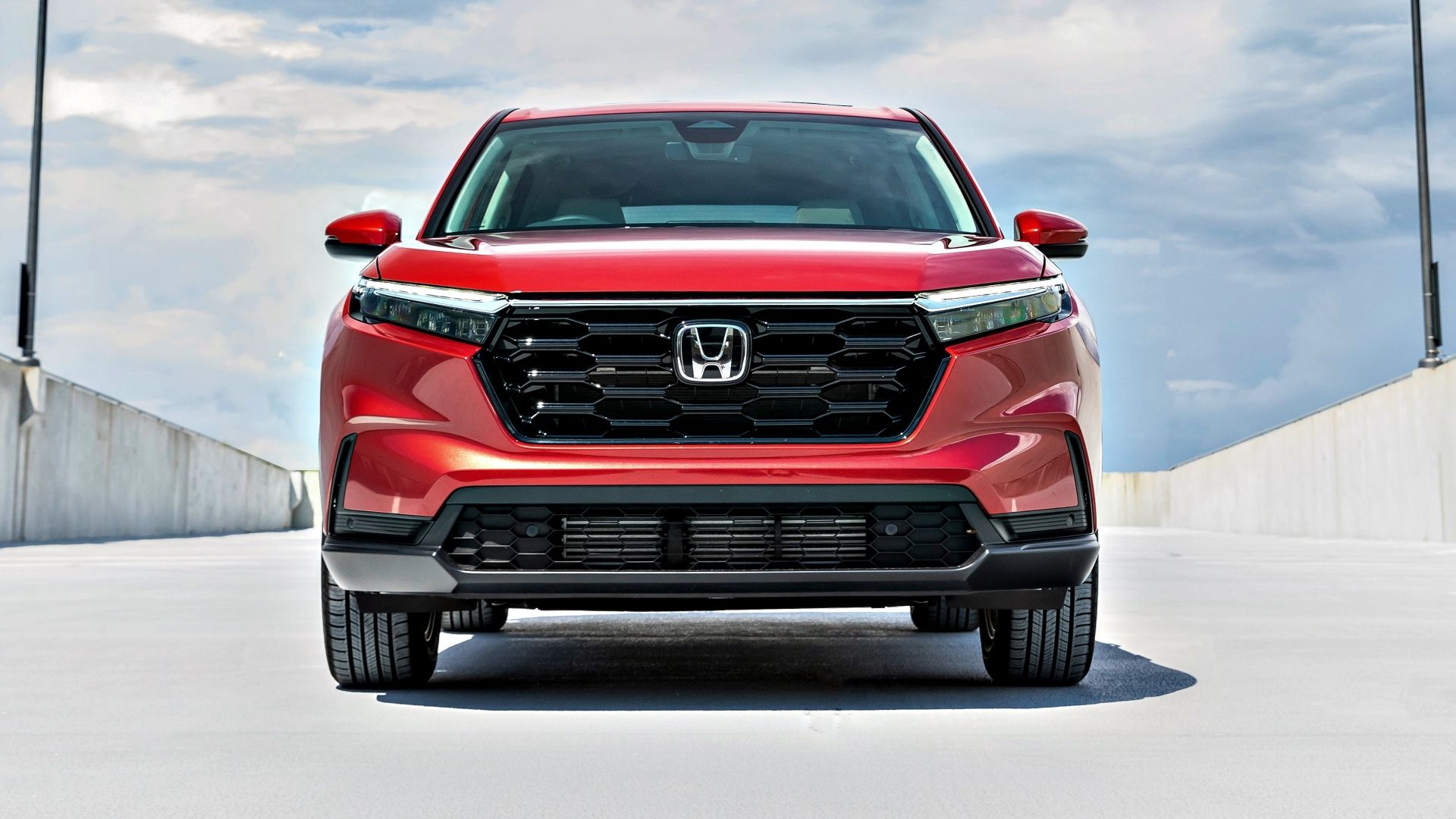
Most Bang For The Buck Trim In The 2024 Honda CR-V Lineup
With the perfect balance of features and affordability, discover the ultimate value pick in the 2024 Honda CR-V lineup
Pricing And Availability
In comparing the pricing of the 2024 Toyota Corolla Cross Hybrid and the 2024 Honda CR-V Hybrid, it’s evident that both models offer a range of trims catering to diverse budget considerations. The Corolla Cross Hybrid starts with the Hybrid S at $28,220, followed by the Hybrid SE at $29,540, and the Hybrid Nightshade at $30,465. The top-tier Hybrid XSE, as heavily featured in this article, comes in at $31,405.
On the Honda side, the CR-V Hybrid begins with the Sport Hybrid at $34,050, followed by the Sport-L Hybrid at $37,050, and the Sport Touring at $40,200, positioning it at a slightly higher price point compared to the Corolla Cross Hybrid’s top trim. All things considered, these pricing structures reflect the nuanced features and enhancements offered across the trims and models, allowing consumers to choose a model that aligns with their preferences and budget constraints.
Trim Pricing Comparison
|
2024 Toyota Corolla Cross Hybrid |
2024 Honda CR-V Hybrid |
|||
|---|---|---|---|---|
|
Trim |
Price |
Trim |
Price |
|
|
Hybrid S |
$28,220 |
Sport Hybrid |
$34,050 |
|
|
Hybrid SE |
$29,540 |
Sport-L Hybrid |
$37,050 |
|
|
Hybrid Nightshade |
$30,465 |
Sport Touring |
$40,200 |
|
|
Hybrid XSE |
$31,405 |
|||
(Prices sourced from Toyota and Honda)


